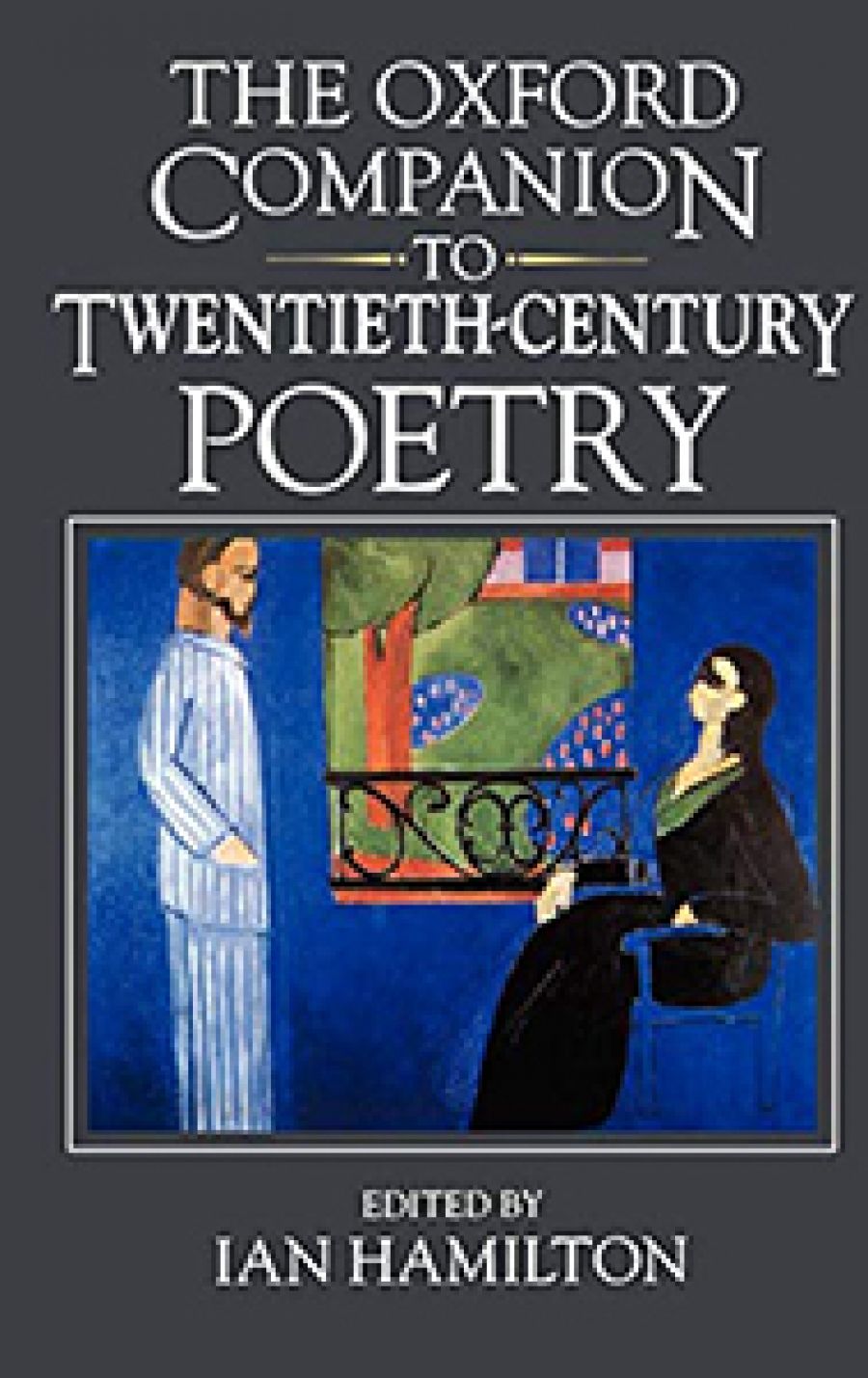
- Free Article: No
- Contents Category: Poetry
- Review Article: Yes
- Article Title: Lofty anachronism
- Online Only: No
- Custom Highlight Text:
As a preliminary I must say, frankly, that I am hardly interested in canonised literary culture. And having known for a long time that it is absurd to criticise the conventional literary establishment and then expect its attention or affection, I can also say that canonical inclusion has never been a personal aspiration. However, I am alert to the ramifications of the processes of historicisation. I don’t want to sound high-falutin’ but I’ll begin with Nietzsche who began his enquiry into the value of history with a gem from Goethe: ‘In any case I hate everything that merely instructs me without augmenting or directly invigorating my activity.’
- Book 1 Title: The Oxford Companion to Twentieth-Century Poetry in English
- Book 1 Biblio: OUP, $59
Why question history? It’s pretty mixed-up anyway in these over-documented times – home-video, biography, autobiography, factual fiction, bold and often nakedly nepotistic newspaper, magazine and TV profiles and so on. Times when living peacenik and anarchist poets sell their manuscripts to military academies and writers keep copies of every letter written (sometimes writing to the famous solely for a response) so as to sell the correspondence to State archives. Perhaps it is pointless to question official versions of history when it’s re-inventing itself in populist ways.
While history has been frenetically throwing its empty bottles out the window it seems as if Oxford University Press has been trying to save the labels. This is not exactly the Oxford Companion to Old Farts’ C20 Poetry in English but it comes close. It is saved from the expected fustiness by an attempt to revise the canon with the inclusion of some previously invisible or neglected non-prize-winners and, in relation to the Australian entries, the exclusion of some still-productive poets who were listed in the 1985 Oxford Companion to Australian Literature. Defrocked maybe, but still practising.
The revision is mainly concerned with the ‘difference’ between US and UK poetry. While this reads a little like the fatherly old annals of the British Empire buying a drink for a bunch of quarrelsome colonials, it is at least an attempt to redress the old-fashioned dominance of ‘Englishness’ as a measure of worthiness in what is a Britishbased compilation. Hence some dodgy headings like ‘Asian/American Poetry’ under which a selection of poets and their book titles are merely listed. More positively, the few Aboriginal Australians are granted individual entries.
Apart from the problems inherent in a habitual pursuit of history there’s the question of the purpose or intended function of a literary companion – what’s it for? (It certainly doesn’t invigorate or augment my writing activities.)
In the introduction Ian Hamilton calls this tome ‘A map of modern poetry’ and, according to him, the map changes about every ten years mostly as a result of ‘fashions’. This glibness enables a swift dismissal of at least one enormous poetic eruption: ‘Surrealism’, he writes, ‘would have bulked larger’ had the list been compiled in 1950. This seems a shallow reflection when practically every First-World poet writing in English since dadaism and surrealism has been influenced by those movements in some way.
There is no heading for modernism. Post-modernism along with cutup and deconstruction, gets a mention under ‘Language Poetry’, dadaism under ‘Sound Poetry’, ‘Vorticism – see Blast’. The metaphor of the map becomes a puny cliché in an age of over-the-horizon radar, satellite communication, CD-ROM and other electronic databases. ‘Who needs this old map?’ is a reasonable question.
The editor says, ‘I want it to be seen as serious and useful, but I will not mind at all if it is read for fun, as a kind of documentary-entertainment’. I’d say it’s about as much fun as cricket statistics in winter – which brings up the next point. He also gives a breakdown of numbers and while there are male poets who are oddly missing there is, yet again, an unfair neglect of women. The overall ratio is 7.5 men to 1 woman. Although there are only 117 Australian poets (constituting about one-fifth of the mostly white poets who registered with D. W. Thorpe’s national reference recently) and there are unjustly absented men, numerous Australian women poets have been denied entry; women who have published often more widely than and have been as publically noted as any of the included. Women whose styles, philosophies, sexual-preferences, ages, ethnicities, politics and poetics differ from each other. Peter Porter, who gave his ‘informal guidance’ to the editor, appears not to have advised consultation of the very eclectic Penguin Book Of Australian Women Poets and yet he entered the co-editors of that collection as if presuming that the rest, the ‘others’, naturally follow.
Furthermore, this kind of complaint is incorporated under the heading ‘Feminist Criticism’ – a few muddled paragraphs which mistake feminism for separatism before reducing to this:
female poets are now waving from the sea in which many of their earlier and less fortunate sisters drowned. They are buoyed up by ideological diversity, and by the sense of different audiences (women of colour, lesbians, workingclass women, the old, the young …).
There is no agenda in relation to young poets. Sorry kids – if you’re alive, published and under thirty you’re not welcome. However, had you been blessed with the foresight of killing yourself before turning thirty, you’re in! No buts! Cool!
Finally, there are inaccuracies in some Australian entries. So it can be assumed that there are mistakes as well as further ridiculous preteritions in the other countries’ lists. What is exasperating is that this kind of intrepidly confident version of poetic history cannot possibly be accurate and, in the end, renders itself ineffective. Despite any revisionist ambitions towards a broad reach, it’s just another lofty anachronism.


Comments powered by CComment